Parallel Ice Sheet Model (PISM)
An open-source modelling framework for ice sheets and glaciers
Cite this software
Description
The Parallel Ice Sheet Model (PISM) is an open-source modelling framework for ice sheets and glaciers. It is parallel, thermodynamically-coupled and capable of high resolution. PISM has been widely adopted as a tool for doing science.
Development of PISM is supported by NASA grants 20-CRYO2020-0052 and 80NSSC22K0274 and NSF grant OAC-2118285.
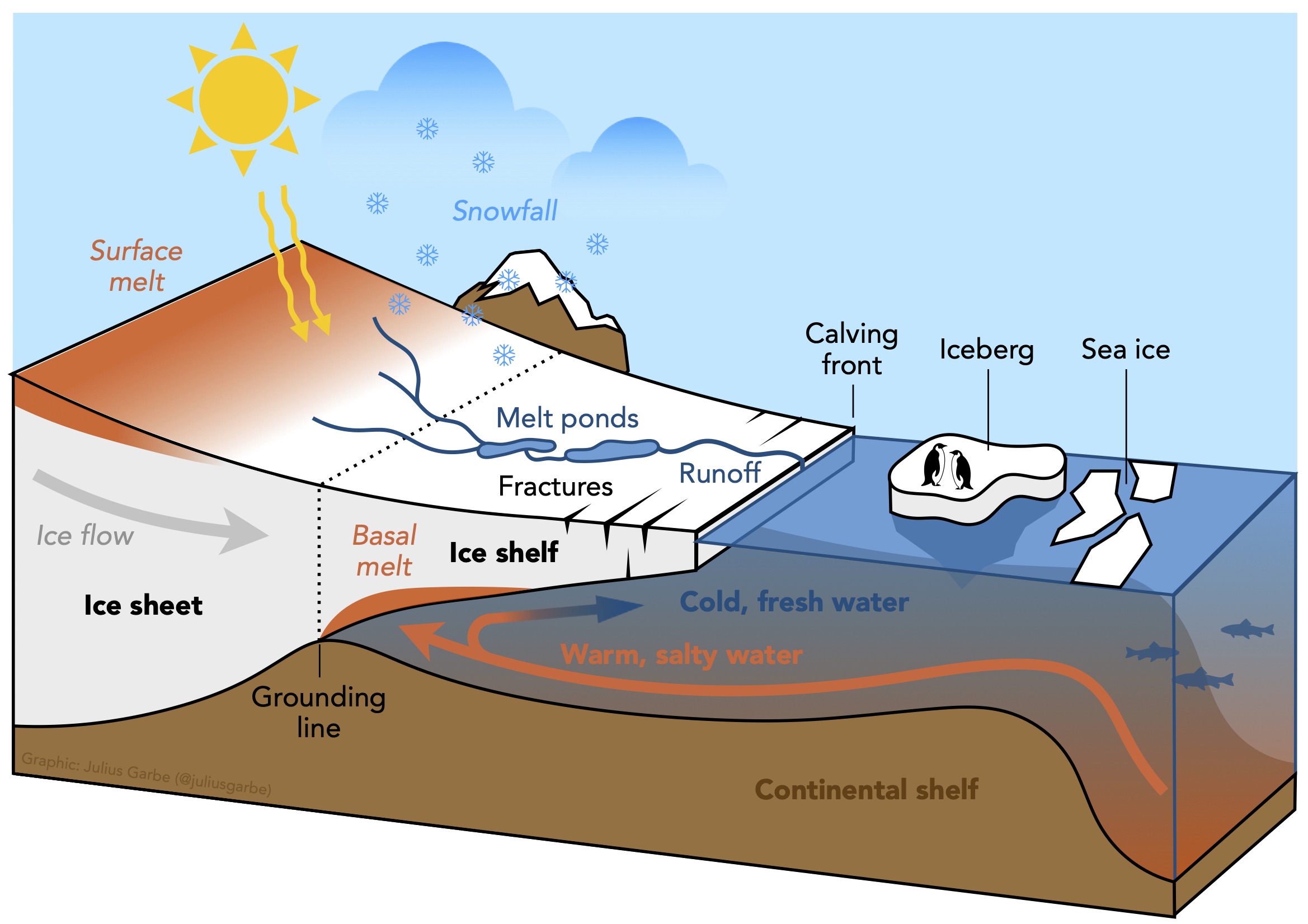
Graphic: J. Garbe
PISM was used in several studies that contributed to major advances in the understanding and model representation of key physical processes which control the behavior of ice sheets, for example:
- Basal sliding: Bueler et al. (2009)
- Energy conservation: Aschwanden et al. (2012)
- Ice-front motion: Albrecht et al. (2011)
- Calving: Levermann et al. (2012)
- Fracture dynamics: Albrecht and Levermann (2012)
- Sub-shelf melt: Reese et al. (2018)
- Surface melt: Zeitz et al. (2021)
- Marine ice-cliff instability (MICI): Schlemm et al. (2022)
Sea-level projections
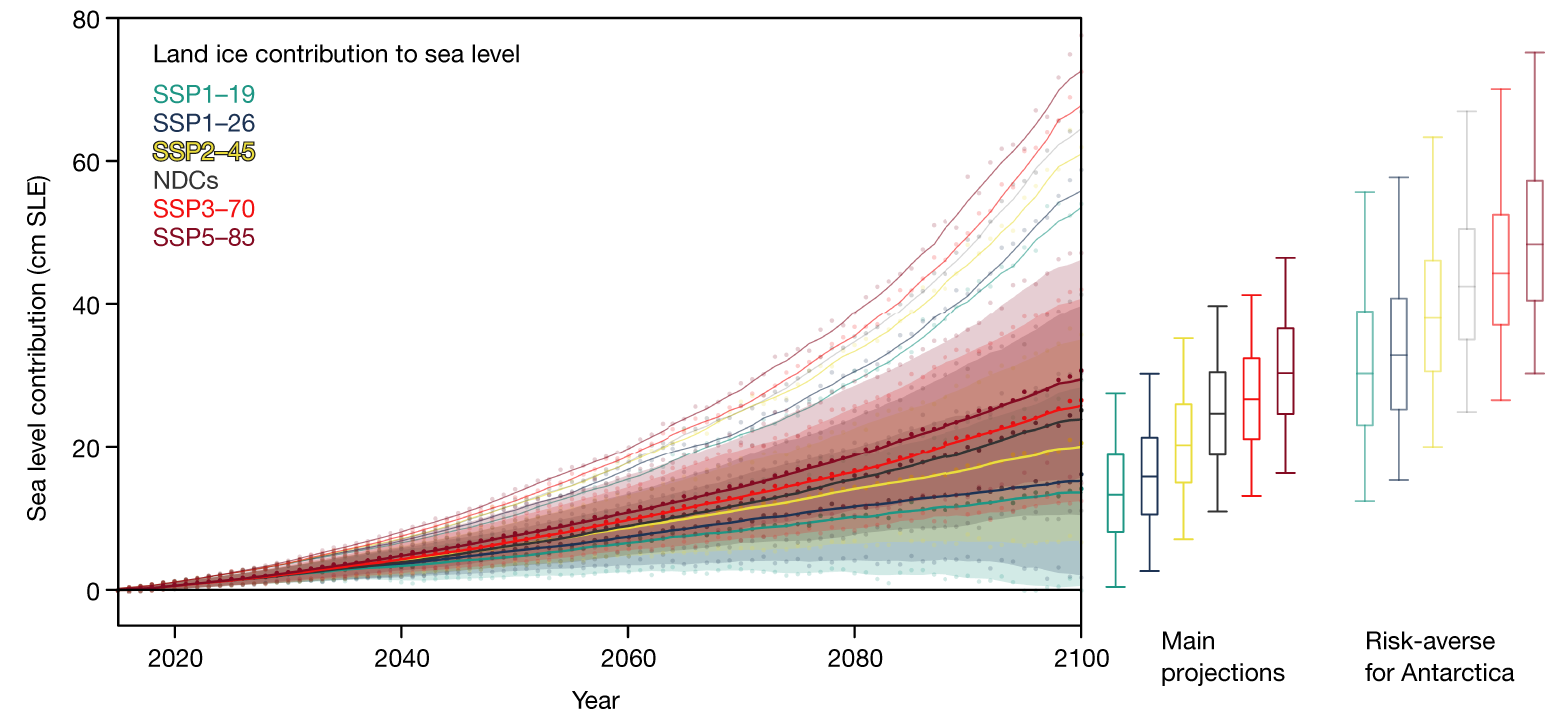
Source: Edwards et al. (2021)
The ice sheets on Greenland and Antartica are the largest freshwater reservoirs with a combined sea-level rise potential of more than 65 meters. Their mass loss and future contributions to sea-level rise in response to different scenarios of changing atmospheric and oceanic conditions can be estimated by applying PISM, as previously accomplished by e.g.:
- Antarctica
- ISMIP6: Seroussi et al. (2020)
- LARMIP-2: Levermann et al. (2020)
- Reese et al. (2020)
- Winkelmann et al. (2015)
- SeaRISE: Nowicki et al. (2013a)
- Greenland
- ISMIP6: Goelzer et al. (2020)
- Aschwanden et al. (2019)
- SeaRISE: Nowicki et al. (2013b)
- Both ice sheets
Glacial cycle simulations
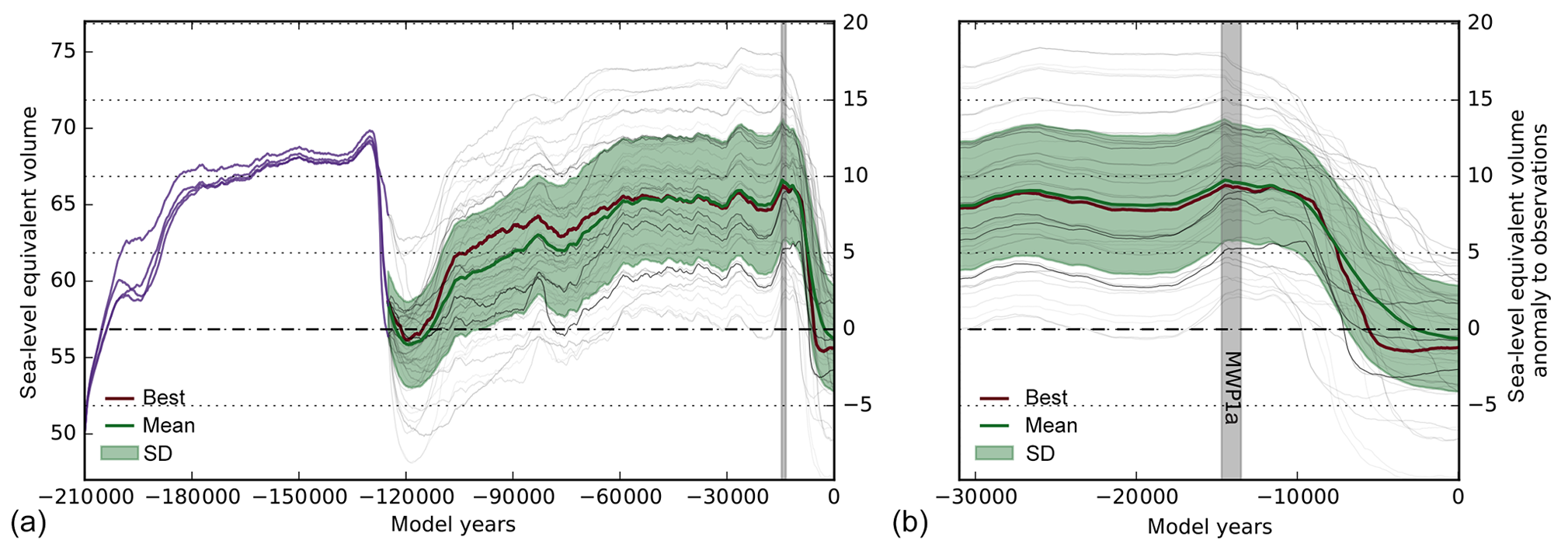
Source: Albrecht et al. (2020b)
Long-term model simulations are helpful for the reconstruction of the glacial-interglacial history of the Earth's ice sheets. This contributes to a better understanding of dynamic threshold behavior and sea-level change in the past but also in the future. For the Antarctic Ice Sheet, an ensemble of glacial-cycle simulations in order to constrain paleo parameter sensitivities and boundary conditions has, for example, been performed using PISM by:
Long-term stability of ice sheets
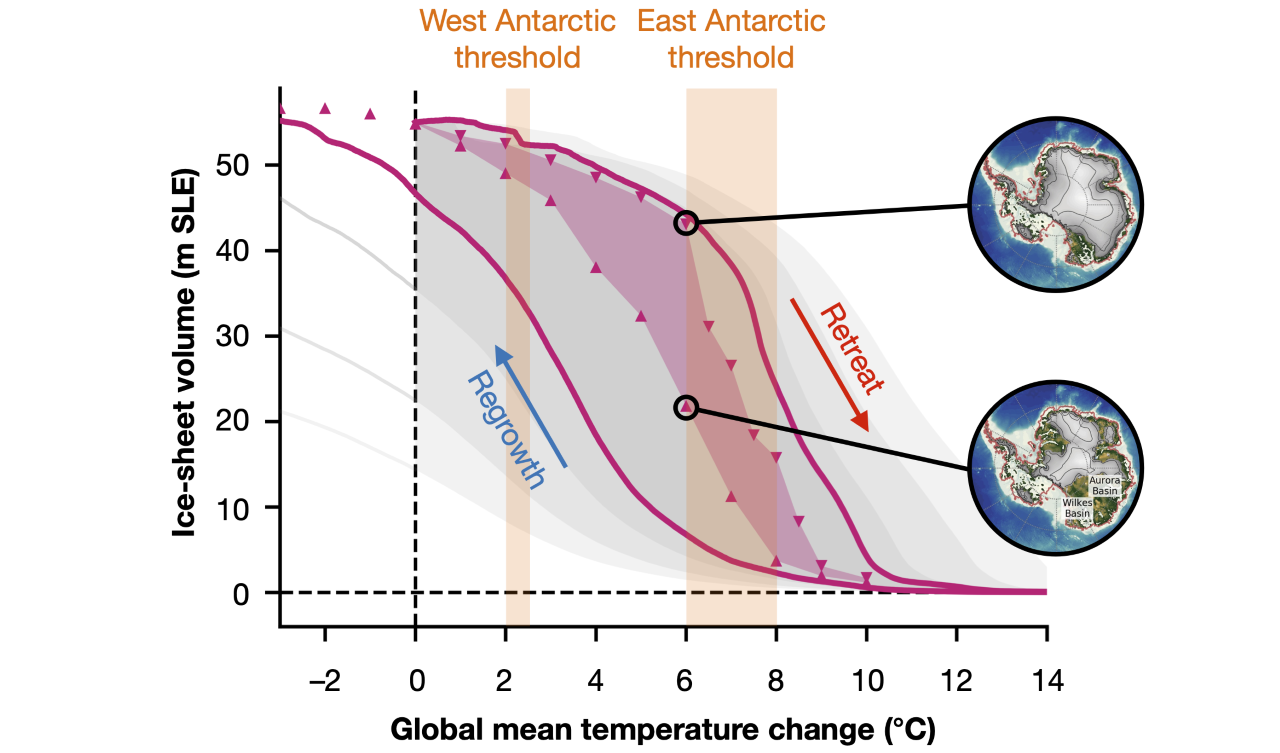
Source: Modified after Garbe et al. (2020)
Several positive and negative feedback mechanisms may impact the stability of ice sheets on long timescales. Examples include the positive surface-melt-elevation feedback or the negative isostatic solid-Earth rebound effect. When crossing critical thresholds, irreversible ice loss may follow. The overall effect of the interplay between various feedback mechanisms in the long term has been assessed in the following studies using PISM, among others:
- Garbe et al. (2020)
- Golledge et al. (2017)
- Clark et al. (2016)
- Feldmann and Levermann (2015)
- Golledge et al. (2015)
- Winkelmann et al. (2015)
Coupling to other Earth system components
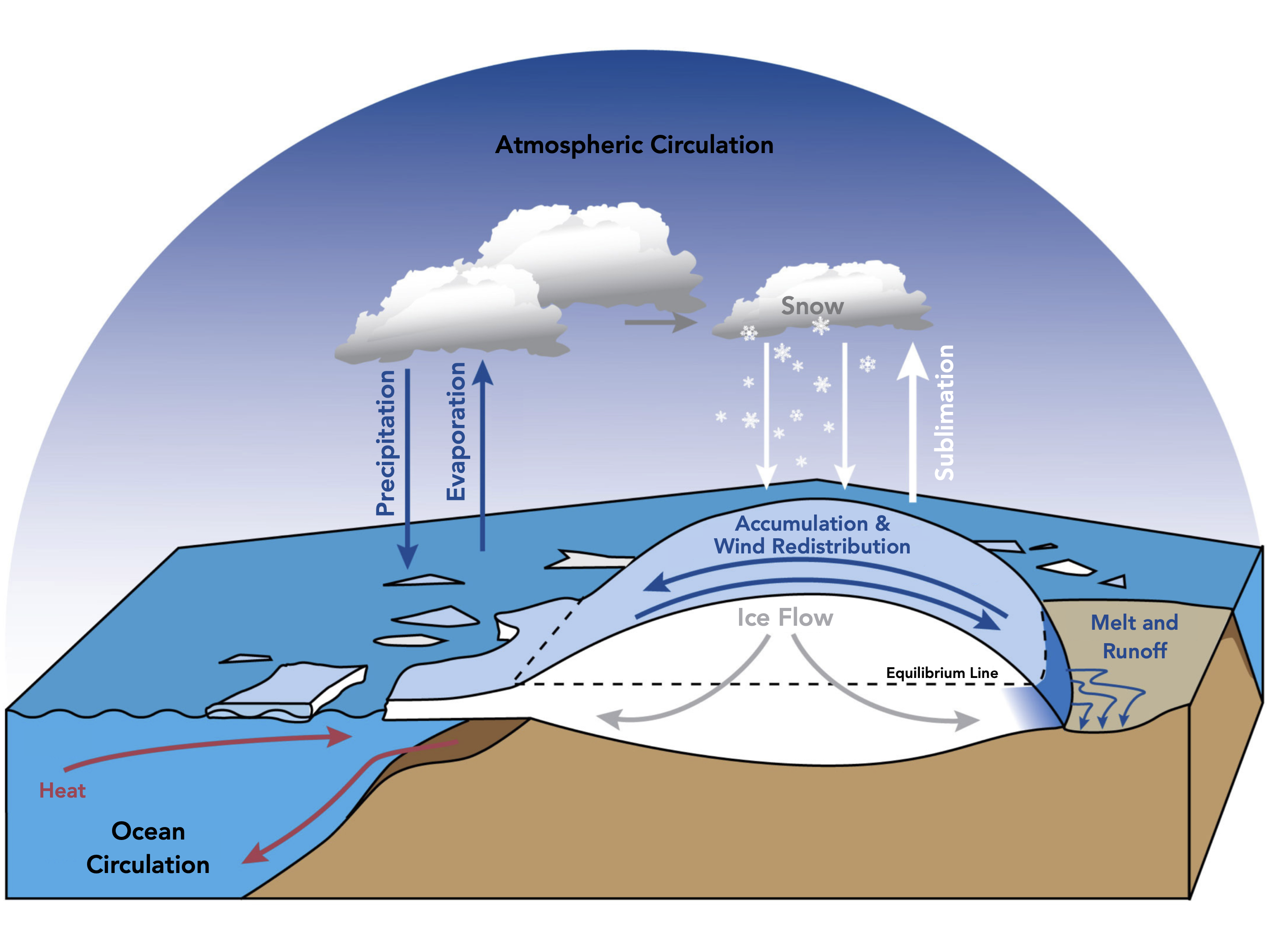
Source: Modified after Zwally et al. (2015)
Ice sheets interact with other Earth system components, such as the atmosphere or the ocean. To take into account and study related feedback mechanisms as well as their effect on the dynamics of the Greenland and Antartic ice sheets, PISM has been coupled to other Earth system components:
- Ocean
- Potsdam Ice-shelf Cavity mOdel (PICO): Reese et al. (2018)
- PISM-MOM: Kreuzer et al. (2021)
- Atmosphere
- dEBM-simple: Zeitz et al. (2021), Garbe et al. (2023)
- Solid-Earth
- Lingle-Clark: Bueler et al. (2007)
- PISM-VILMA (work in progress)
Model intercomparisons
PISM has participated in numerous model intercomparison projects (MIPs). For a complete list, please see MIPs & Collaborations.
Support
If you are looking for help with PISM, feel free to join the PISM workspace on Slack. You can also contact the developers team directly or write an e-mail to uaf-pism@alaska.edu.
Contributing
Bug reports, contributions of code, documentation, and tests are always appreciated. Please see the PISM manual for instructions.

Participating organisations
Reference papers
- 1.Author(s): R. Winkelmann, M. A. Martin, M. Haseloff, T. Albrecht, E. Bueler, C. Khroulev, A. LevermannPublished in The Cryosphere by Copernicus GmbH in 2011, page: 715-72610.5194/tc-5-715-2011
- 2.Author(s): Ed Bueler, Jed BrownPublished in Journal of Geophysical Research: Earth Surface by American Geophysical Union (AGU) in 200910.1029/2008jf001179
Mentions
- 1.Author(s): David Michael Holland, Mainak MondalPublished in Reference Module in Earth Systems and Environmental Sciences by Elsevier in 202510.1016/b978-0-323-85242-5.00073-7
- 2.Author(s): Daniel P. Lowry, Bella Duncan, Bethan Joan Davies, Anna Ruth HalberstadtPublished in Reference Module in Earth Systems and Environmental Sciences by Elsevier in 202410.1016/b978-0-323-85242-5.00004-x
- 3.Author(s): Martin Siegert, Nicholas R. GolledgePublished in Antarctic Climate Evolution by Elsevier in 2022, page: 199-21810.1016/b978-0-12-819109-5.00006-2
- 4.Author(s): Florence Colleoni, Laura De Santis, Tim R. Naish, Robert M. DeConto, Carlota Escutia, Paolo Stocchi, Gabriele Uenzelmann-Neben, Katharina Hochmuth, Claus-Dieter Hillenbrand, Tina van de Flierdt, Lara F. Pérez, German Leitchenkov, Francesca Sangiorgi, Stewart Jamieson, Michael J. Bentley, David J. WilsonPublished in Antarctic Climate Evolution by Elsevier in 2022, page: 689-76810.1016/b978-0-12-819109-5.00010-4
- 5.Author(s): Da Huo, Michael P. Bishop, Brennan W. Young, Zhaohui Chi, Umesh K. HaritashyaPublished in Treatise on Geomorphology by Elsevier in 2022, page: 143-16810.1016/b978-0-12-818234-5.00019-5
- 6.Published in The Ocean and Cryosphere in a Changing Climate by Cambridge University Press in 2022, page: 321-44610.1017/9781009157964.012
- 7.Author(s): Ed BuelerPublished in Springer Textbooks in Earth Sciences, Geography and Environment, Glaciers and Ice Sheets in the Climate System by Springer International Publishing in 2020, page: 185-21710.1007/978-3-030-42584-5_8
- 8.Author(s): Jerry Watkins, Irina Tezaur, Irina DemeshkoPublished in Lecture Notes in Computational Science and Engineering, Numerical Methods for Flows by Springer International Publishing in 2020, page: 177-18810.1007/978-3-030-30705-9_16
- 9.Author(s): Patrick J. RoachePublished in Simulation Foundations, Methods and Applications, Computer Simulation Validation by Springer International Publishing in 2019, page: 295-31810.1007/978-3-319-70766-2_12
- 10.Published in Climate System Dynamics and Modelling by Cambridge University Press in 2015, page: 317-34010.1017/cbo9781316018682.010
- 11.Published in Climate System Dynamics and Modelling by Cambridge University Press in 2015, page: 247-28410.1017/cbo9781316018682.007
- 12.Published in Climate System Dynamics and Modelling by Cambridge University Press in 2015, page: 30-7210.1017/cbo9781316018682.003
- 13.Author(s): Zhihua Zhang, John C. MoorePublished in Mathematical and Physical Fundamentals of Climate Change by Elsevier in 2015, page: 441-45510.1016/b978-0-12-800066-3.00013-9
- 14.Published in Climate System Dynamics and Modelling by Cambridge University Press in 2015, page: 178-24610.1017/cbo9781316018682.006
- 15.Published in Climate System Dynamics and Modelling by Cambridge University Press in 2015, page: 133-17710.1017/cbo9781316018682.005
- 16.Published in Climate System Dynamics and Modelling by Cambridge University Press in 2015, page: xi-xii10.1017/cbo9781316018682.001
- 17.Published in Climate System Dynamics and Modelling by Cambridge University Press in 2015, page: 73-13210.1017/cbo9781316018682.004
- 18.Author(s): Phillip DickensPublished in Lecture Notes in Computer Science, Algorithms and Architectures for Parallel Processing by Springer International Publishing in 2015, page: 131-14710.1007/978-3-319-27140-8_10
- 19.Published in Climate System Dynamics and Modelling by Cambridge University Press in 2015, page: 1-2910.1017/cbo9781316018682.002
- 20.Published in Climate System Dynamics and Modelling by Cambridge University Press in 2015, page: 285-28610.1017/cbo9781316018682.008
- 21.Author(s): Andreas Vieli, Faezeh M. NickPublished in Space Sciences Series of ISSI, The Earth's Cryosphere and Sea Level Change by Springer Netherlands in 2011, page: 437-45810.1007/978-94-007-2063-3_9
- 22.Author(s): Andrew FowlerPublished in Interdisciplinary Applied Mathematics, Mathematical Geoscience by Springer London in 2011, page: 617-73910.1007/978-0-85729-721-1_10
- 23.Author(s): Heinz Blatter, Ralf Greve, Ayako Abe-OuchiPublished in Space Sciences Series of ISSI, The Earth's Cryosphere and Sea Level Change by Springer Netherlands in 2011, page: 555-58310.1007/978-94-007-2063-3_16
- 1.Author(s): M. Urbanč, M. DepolliPublished in 2023 46th MIPRO ICT and Electronics Convention (MIPRO) by IEEE in 2023, page: 315-32010.23919/mipro57284.2023.10159747
- 2.Author(s): Aljaz Bavec, Matjaz DepolliPublished in 2022 45th Jubilee International Convention on Information, Communication and Electronic Technology (MIPRO) by IEEE in 2022, page: 245-25010.23919/mipro55190.2022.9803326
- 3.Author(s): Firas Mourad, Emmanuel Witrant, Frank PattynPublished in 2018 Annual American Control Conference (ACC) by IEEE in 2018, page: 3014-301910.23919/acc.2018.8431855
- 4.Author(s): Phillip M. Dickens, Christopher Dufour, James FastookPublished in 2018 IEEE International Parallel and Distributed Processing Symposium Workshops (IPDPSW) by IEEE in 2018, page: 977-98610.1109/ipdpsw.2018.00152
- 5.Author(s): Phillip Dickens, Christopher Dufour, James FastookPublished in 201610.5555/3042094.3042318
- 6.Author(s): Phillip Dickens, Timothy MoreyPublished in 2013 IEEE International Symposium on Parallel & Distributed Processing, Workshops and Phd Forum by IEEE in 2013, page: 1336-134410.1109/ipdpsw.2013.255
- 1.Author(s): Baohuang Su, Yong SunPublished in Global and Planetary Change by Elsevier BV in 2026, page: 10520210.1016/j.gloplacha.2025.105202
- 2.Author(s): Molly O. Patterson, Christiana Rosenberg, Osamu Seki, Masanobu Yamamoto, Oscar E. Romero, Mei Nelissen, Francesca Sangiorgi, Nicholas R. Golledge, Georgia Grant, William D. Arnuk, Benjamin Keisling, Timothy Naish, Richard Levy, Stephen Meyers, Nicholas Sullivan, Jeanine Ash, Denise Kulhanek, Brian W. Romans, Natalia Varela Valenzuela, Harold Jones, Francois Beny, Imogen Browne, Giuseppe Cortese, Isobela M. C. Sousa, Justin P. Dodd, Oliver M. Esper, Jenny Gales, David Harwood, Saki Ishino, Sookwan Kim, Sunghan Kim, Jan S. Laberg, R. Mark Leckie, Juliane Müller, Amelia Shevenell, Shiv Singh, Saiko T. Sugisaki, Tina van de Flierdt, Tim van Peer, Wenshen Xiao, Zhifang Xiong, Laura De Santis, Robert McKayPublished in Nature Geoscience by Springer Science and Business Media LLC in 202610.1038/s41561-025-01840-y
- 3.Author(s): Violaine Coulon, Ann Kristin Klose, Tamsin Edwards, Fiona Turner, Frank Pattyn, Ricarda WinkelmannPublished in Nature Communications by Springer Science and Business Media LLC in 202510.1038/s41467-025-66178-w
- 4.Author(s): Mingyu Yan, Jun Yang, Dawei Li, Weiwen Ji, Shuai YuanPublished in Journal of Geophysical Research: Atmospheres by American Geophysical Union (AGU) in 202510.1029/2024jd042495
- 5.Author(s): Moritz Kreuzer, Torsten Albrecht, Lena Nicola, Ronja Reese, Ricarda WinkelmannPublished in The Cryosphere by Copernicus GmbH in 2025, page: 1181-120310.5194/tc-19-1181-2025
- 6.Author(s): Mikkel Langgaard Lauritzen, Anne Solgaard, Nicholas Mossor Rathmann, Bo Møllesøe Vinther, Aslak Grindsted, Brice Noël, Guðfinna Aðalgeirsdóttir, Christine Schøtt HvidbergPublished in The Cryosphere by Copernicus GmbH in 2025, page: 3599-362210.5194/tc-19-3599-2025
- 7.Author(s): Lev Tarasov, Benoit S. Lecavalier, Kevin Hank, David PollardPublished in Geoscientific Model Development by Copernicus GmbH in 2025, page: 9565-960310.5194/gmd-18-9565-2025
- 8.Author(s): Constantijn J. Berends, Victor Azizi, Jorge A. Bernales, Roderik S. W. van de WalPublished in Geoscientific Model Development by Copernicus GmbH in 2025, page: 3635-365910.5194/gmd-18-3635-2025
- 9.Author(s): Younghyun Koo, Gong Cheng, Mathieu Morlighem, Maryam RahnemoonfarPublished in The Cryosphere by Copernicus GmbH in 2025, page: 2583-259910.5194/tc-19-2583-2025
- 10.Author(s): Marianne Haseloff, Ian J. Hewitt, Richard F. KatzPublished in The Cryosphere by Copernicus GmbH in 2025, page: 5939-595710.5194/tc-19-5939-2025
- 11.Author(s): Yanjun Li, Violaine Coulon, Javier Blasco, Gang Qiao, Qinghua Yang, Frank PattynPublished in The Cryosphere by Copernicus GmbH in 2025, page: 4373-439010.5194/tc-19-4373-2025
- 12.Author(s): Tancrède P. M. Leger, Guillaume Jouvet, Sarah Kamleitner, Jürgen Mey, Frédéric Herman, Brandon D. Finley, Susan Ivy-Ochs, Andreas Vieli, Andreas Henz, Samuel U. NussbaumerPublished in Nature Communications by Springer Science and Business Media LLC in 202510.1038/s41467-025-56168-3
- 13.Author(s): Franka Jesse, Erwin Lambert, Roderik S. W. van de WalPublished in The Cryosphere by Copernicus GmbH in 2025, page: 3849-387210.5194/tc-19-3849-2025
- 14.Author(s): Daniel H. Richards, Elisa Mantelli, Samuel S. Pegler, Sandra PiazoloPublished in The Cryosphere by Copernicus GmbH in 2025, page: 6943-696410.5194/tc-19-6943-2025
- 15.Author(s): David M. Chandler, Petra M. Langebroek, Ronja Reese, Torsten Albrecht, Julius Garbe, Ricarda WinkelmannPublished in Communications Earth & Environment by Springer Science and Business Media LLC in 202510.1038/s43247-025-02366-2
- 16.Author(s): Baohuang Su, Yong Sun, Mengzi ZhouPublished in Scientific Data by Springer Science and Business Media LLC in 202510.1038/s41597-025-05297-x
- 17.Author(s): Tim van den Akker, William H. Lipscomb, Gunter R. Leguy, Jorjo Bernales, Constantijn J. Berends, Willem Jan van de Berg, Roderik S. W. van de WalPublished in The Cryosphere by Copernicus GmbH in 2025, page: 283-30110.5194/tc-19-283-2025
- 18.Author(s): Mingyu Yan, Jun Yang, Dawei LiPublished in Journal of Geophysical Research: Atmospheres by American Geophysical Union (AGU) in 202510.1029/2025jd043536
- 19.Author(s): Yingkui Li, Benjamin J.C. Laabs, Leif S. Anderson, Joseph M. LicciardiPublished in Geomorphology by Elsevier BV in 2025, page: 10989310.1016/j.geomorph.2025.109893
- 20.Author(s): Benoit S. Lecavalier, Lev TarasovPublished in The Cryosphere by Copernicus GmbH in 2025, page: 919-95310.5194/tc-19-919-2025
- 21.Author(s): Lena Nicola, Ronja Reese, Moritz Kreuzer, Torsten Albrecht, Ricarda WinkelmannPublished in The Cryosphere by Copernicus GmbH in 2025, page: 2263-228710.5194/tc-19-2263-2025
- 22.Author(s): Ivan Utkin, Yilu Chen, Ludovic Räss, Mauro A. WerderPublished in Journal of Glaciology by Cambridge University Press (CUP) in 202510.1017/jog.2025.40
- 23.Author(s): Eric W. Wolff, Robert Mulvaney, Mackenzie M. Grieman, Helene M. Hoffmann, Jack Humby, Christoph Nehrbass-Ahles, Rachael H. Rhodes, Isobel F. Rowell, Louise C. Sime, Hubertus Fischer, Thomas F. Stocker, Amaelle Landais, Frédéric Parrenin, Eric J. Steig, Marina Dütsch, Nicholas R. GolledgePublished in Nature by Springer Science and Business Media LLC in 2025, page: 133-13710.1038/s41586-024-08394-w
- 24.Author(s): Meike D. W. Scherrenberg, Constantijn J. Berends, Roderik S. W. van de WalPublished in Climate of the Past by Copernicus GmbH in 2025, page: 1061-107710.5194/cp-21-1061-2025
- 25.Author(s): Kaian Shahateet, Johannes J. Fürst, Francisco Navarro, Thorsten Seehaus, Daniel Farinotti, Matthias BraunPublished in The Cryosphere by Copernicus GmbH in 2025, page: 1577-159710.5194/tc-19-1577-2025
- 26.Author(s): Nicolas Stoll, Ilka Weikusat, Daniela Jansen, Paul Bons, Kyra Darányi, Julien Westhoff, María-Gema Llorens, David Wallis, Jan Eichler, Tomotaka Saruya, Tomoyuki Homma, Sune Olander Rasmussen, Giulia Sinnl, Anders Svensson, Martyn Drury, Frank Wilhelms, Sepp Kipfstuhl, Dorthe Dahl-Jensen, Johanna KerchPublished in The Cryosphere by Copernicus GmbH in 2025, page: 3805-383010.5194/tc-19-3805-2025
- 27.Author(s): C. J. van Calcar, J. Bernales, C. J. Berends, W. van der Wal, R. S. W. van de WalPublished in Nature Communications by Springer Science and Business Media LLC in 202510.1038/s41467-025-66435-y
- 28.Author(s): G. Leloup, A. Quiquet, D. M. Roche, C. Dumas, D. PaillardPublished in Geophysical Research Letters by American Geophysical Union (AGU) in 202510.1029/2024gl111492
- 29.Author(s): Christian Wirths, Antoine Hermant, Christian Stepanek, Thomas F. Stocker, Johannes C. R. SutterPublished in Nature Communications by Springer Science and Business Media LLC in 202510.1038/s41467-025-65375-x
- 30.Author(s): Qing Yan, Lewis A. Owen, Ting Wei, Philip D. Hughes, Xiaohan Kong, Nanxuan Jiang, Jinzhe Zhang, Zhongshi Zhang, Huijun WangPublished in Nature Communications by Springer Science and Business Media LLC in 202510.1038/s41467-025-60438-5
- 31.Author(s): Tancrède P. M. Leger, Jeremy C. Ely, Christopher D. Clark, Sarah L. Bradley, Rosie E. Archer, Jiang ZhuPublished in The Cryosphere by Copernicus GmbH in 2025, page: 5719-576110.5194/tc-19-5719-2025
- 32.Author(s): Maaike Izeboud, Bert Wouters, Sophie de Roda Husman, Stef LhermittePublished in Nature Climate Change by Springer Science and Business Media LLC in 2025, page: 1333-133910.1038/s41558-025-02453-4
- 33.Author(s): Lukas Gegg, Bernhard C. Salcher, Thomas Pollhammer, Denis Cohen, Urs H. Fischer, Angela LandgrafPublished in Boreas by Wiley in 2025, page: 527-54110.1111/bor.12693
- 34.Author(s): Ward van Pelt, Thomas FrankPublished in The Cryosphere by Copernicus GmbH in 2025, page: 1-1710.5194/tc-19-1-2025
- 35.Author(s): R. L. Veness, C. D. Clark, J. C. Ely, J. L. Knight, A. Igneczi, S. L. BradleyPublished in Journal of Quaternary Science by Wiley in 2025, page: 944-95710.1002/jqs.3720
- 36.Author(s): Bastien Mathieux, Anne Replumaz, Marie-Luce ChevalierPublished in Quaternary Science Reviews by Elsevier BV in 2025, page: 10946010.1016/j.quascirev.2025.109460
- 37.Author(s): Daniel Moreno-Parada, Alexander Robinson, Marisa Montoya, Jorge Alvarez-SolasPublished in Geoscientific Model Development by Copernicus GmbH in 2025, page: 3895-391910.5194/gmd-18-3895-2025
- 38.Author(s): Samuel T. Kodama, Tamara Pico, Alexander A. Robel, John Erich Christian, Natalya Gomez, Casey Vigilia, Evelyn Powell, Jessica Gagliardi, Slawek Tulaczyk, Terrence BlackburnPublished in The Cryosphere by Copernicus GmbH in 2025, page: 2935-294810.5194/tc-19-2935-2025
- 39.Author(s): Lu Niu, Gregor Knorr, Lars Ackermann, Uta Krebs-Kanzow, Gerrit LohmannPublished in npj Climate and Atmospheric Science by Springer Science and Business Media LLC in 202510.1038/s41612-025-00982-5
- 40.Author(s): Tancrède P. M. Leger, Christopher D. Clark, Carla Huynh, Sharman Jones, Jeremy C. Ely, Sarah L. Bradley, Christiaan Diemont, Anna L. C. HughesPublished in Climate of the Past by Copernicus GmbH in 2024, page: 701-75510.5194/cp-20-701-2024
- 41.Author(s): Alexander T. Bradley, Robert J. Arthern, David T. Bett, C. Rosie Williams, James ByrnePublished in Journal of Open Source Software by The Open Journal in 2024, page: 558410.21105/joss.05584
- 42.Author(s): Violaine Coulon, Jan De Rydt, Thomas Gregov, Qing Qin, Frank PattynPublished in Geophysical Research Letters by American Geophysical Union (AGU) in 202410.1029/2024gl111250
- 43.Author(s): Dennis Höning, Matteo Willeit, Andrey GanopolskiPublished in Environmental Research Letters by IOP Publishing in 2024, page: 02403810.1088/1748-9326/ad2129
- 44.Author(s): James D. Kirkham, Kelly A. Hogan, Robert D. Larter, Neil S. Arnold, Jeremy C. Ely, Chris D. Clark, Ed Self, Ken Games, Mads Huuse, Margaret A. Stewart, Dag Ottesen, Julian A. DowdeswellPublished in Quaternary Science Reviews by Elsevier BV in 2024, page: 10768010.1016/j.quascirev.2022.107680
- 45.Author(s): Hélène Seroussi, Tyler Pelle, William H. Lipscomb, Ayako Abe‐Ouchi, Torsten Albrecht, Jorge Alvarez‐Solas, Xylar Asay‐Davis, Jean‐Baptiste Barre, Constantijn J. Berends, Jorge Bernales, Javier Blasco, Justine Caillet, David M. Chandler, Violaine Coulon, Richard Cullather, Christophe Dumas, Benjamin K. Galton‐Fenzi, Julius Garbe, Fabien Gillet‐Chaulet, Rupert Gladstone, Heiko Goelzer, Nicholas Golledge, Ralf Greve, G. Hilmar Gudmundsson, Holly Kyeore Han, Trevor R. Hillebrand, Matthew J. Hoffman, Philippe Huybrechts, Nicolas C. Jourdain, Ann Kristin Klose, Petra M. Langebroek, Gunter R. Leguy, Daniel P. Lowry, Pierre Mathiot, Marisa Montoya, Mathieu Morlighem, Sophie Nowicki, Frank Pattyn, Antony J. Payne, Aurélien Quiquet, Ronja Reese, Alexander Robinson, Leopekka Saraste, Erika G. Simon, Sainan Sun, Jake P. Twarog, Luke D. Trusel, Benoit Urruty, Jonas Van Breedam, Roderik S. W. van de Wal, Yu Wang, Chen Zhao, Thomas ZwingerPublished in Earth's Future by American Geophysical Union (AGU) in 202410.1029/2024ef004561
- 46.Author(s): Daniel Moreno-Parada, Alexander Robinson, Marisa Montoya, Jorge Alvarez-SolasPublished in The Cryosphere by Copernicus GmbH in 2024, page: 4215-423210.5194/tc-18-4215-2024
- 47.Author(s): Antonio Juarez-Martinez, Javier Blasco, Alexander Robinson, Marisa Montoya, Jorge Alvarez-SolasPublished in The Cryosphere by Copernicus GmbH in 2024, page: 4257-428310.5194/tc-18-4257-2024
- 48.Author(s): Lars Ackermann, Thomas Rackow, Kai Himstedt, Paul Gierz, Gregor Knorr, Gerrit LohmannPublished in Geoscientific Model Development by Copernicus GmbH in 2024, page: 3279-330110.5194/gmd-17-3279-2024
- 49.Author(s): J. P. Klages, C.-D. Hillenbrand, S. M. Bohaty, U. Salzmann, T. Bickert, G. Lohmann, H. S. Knahl, P. Gierz, L. Niu, J. Titschack, G. Kuhn, T. Frederichs, J. Müller, T. Bauersachs, R. D. Larter, K. Hochmuth, W. Ehrmann, G. Nehrke, F. J. Rodríguez-Tovar, G. Schmiedl, S. Spezzaferri, A. Läufer, F. Lisker, T. van de Flierdt, A. Eisenhauer, G. Uenzelmann-Neben, O. Esper, J. A. Smith, H. Pälike, C. Spiegel, R. Dziadek, T. A. Ronge, T. Freudenthal, K. GohlPublished in Science by American Association for the Advancement of Science (AAAS) in 2024, page: 322-32710.1126/science.adj3931
- 50.Author(s): Andrés Castillo-Llarena, Franco Retamal-Ramírez, Jorge Bernales, Martín Jacques-Coper, Matthias Prange, Irina RogozhinaPublished in Climate of the Past by Copernicus GmbH in 2024, page: 1559-157710.5194/cp-20-1559-2024
- 1.Author(s): Laurine van HaastrechtPublished by Victoria University of Wellington Library10.26686/wgtn.17148128
- 2.Author(s): Robert James VogtPublished by University of Northern British Columbia10.24124/2015/bpgub1043
- 3.Author(s): Constantijn Johannes BerendsPublished by Utrecht University Library10.33540/109
- 4.Author(s): Daniel P. LowryPublished by Victoria University of Wellington Library10.26686/wgtn.17142116.v1
- 1.Author(s): Qiong Wang, Xin Wang, Keqin Duan, Qiao Liu, Yongsheng Yin, Weijie Ran, Shiyin Liu, Tobias Bolch, Francesca Baldacchino, Jinping He, Yongjian Ding, Yaonan Zhang, Yong Zhang, Junfeng Wei, Zongli Jiang, Xiaojie ChenPublished in 202610.1038/s43247-026-03225-4
- 2.Author(s): Caroline J. van Calcar, Pippa L. Whitehouse, Roderik S. W. van de Wal, Wouter van der WalPublished in 202610.5194/tc-20-757-2026
- 3.Author(s): Ricarda Winkelmann, Julius Garbe, Jonathan F. Donges, Torsten AlbrechtPublished in 202610.1038/s41558-025-02554-0
- 4.Author(s): Tim van den Akker, William H. Lipscomb, Gunter R. Leguy, Willem Jan van de Berg, Roderik S. W. van de WalPublished in 202610.5194/tc-20-1217-2026
- 5.Author(s): Clemens SchannwellPublished by Copernicus GmbH in 202410.5194/egusphere-2024-457-rc1
- 6.Author(s): Gong Cheng, Mathieu Morlighem, Sade FrancisPublished by Wiley in 202410.22541/essoar.170965007.78479393/v1
- 7.Author(s): Meike D. W. Scherrenberg, Constantijn J. Berends, Roderik S. W. van de WalPublished by Copernicus GmbH in 202410.5194/cp-2024-57
- 8.Author(s): Ethan LeePublished by Copernicus GmbH in 202410.5194/egusphere-2024-544-rc2
- 9.Author(s): Matt KingPublished by Copernicus GmbH in 202410.5194/egusphere-2023-2990-rc1
- 10.Published by Copernicus GmbH in 202410.5194/egusphere-2023-2794-rc3
- 11.Published by Copernicus GmbH in 202410.5194/cp-2024-57-rc1
- 12.Published by Copernicus GmbH in 202410.5194/egusphere-2024-544-rc1
- 13.Author(s): George LuPublished by Copernicus GmbH in 202410.5194/egusphere-2023-2794-ac3
- 14.Author(s): Guy PaxmanPublished by Copernicus GmbH in 202410.5194/egusphere-2023-2502-ac1
- 15.Author(s): Ethan LeePublished by Copernicus GmbH in 202410.5194/egusphere-2024-544-rc3
- 16.Author(s): Lena NicolaPublished by Copernicus GmbH in 202410.5194/egusphere-2023-2583-ac4
- 17.Author(s): Lena NicolaPublished by Copernicus GmbH in 202410.5194/egusphere-2023-2583-ac3
- 18.Author(s): Erwin LambertPublished by Copernicus GmbH in 202410.5194/egusphere-2023-2583-rc2
- 19.Published by Copernicus GmbH in 202410.5194/egusphere-2023-2583-rc3
- 20.Author(s): Tijn BerendsPublished by Copernicus GmbH in 202410.5194/gmd-2024-5-ac2
- 21.Author(s): Matjaž DepolliPublished by Copernicus GmbH in 202410.5194/egusphere-2024-544-ac2
- 22.Author(s): Torsten AlbrechtPublished by Copernicus GmbH in 202410.5194/gmd-2024-5-rc2
- 23.Author(s): Thomas ZwingerPublished by Copernicus GmbH in 202410.5194/gmd-2024-5-rc1
- 24.Author(s): Johannes SutterPublished by Copernicus GmbH in 202410.5194/egusphere-2023-2737-rc2
- 25.Author(s): Qiong Wang, Xin Wang, Keqin Duan, Shiyin Liu, Yongsheng Yin, Qiao Liu, Jinping He, Yong Zhang, Junfeng Wei, Zongli JiangPublished by Springer Science and Business Media LLC in 202410.21203/rs.3.rs-5301165/v1
- 26.Published by Copernicus GmbH in 202410.5194/egusphere-2023-2583-rc1
- 27.Author(s): Daniel Moreno-ParadaPublished by Copernicus GmbH in 202410.5194/egusphere-2023-2690-ac1
- 28.Author(s): Lena NicolaPublished by Copernicus GmbH in 202410.5194/egusphere-2023-2583-ac2
- 29.Published by Copernicus GmbH in 202410.5194/egusphere-2024-2223-cc1
- 30.Author(s): Johannes FeldmannPublished by Copernicus GmbH in 202410.5194/egusphere-2024-457-ac1
- 31.Published by Copernicus GmbH in 202410.5194/egusphere-2023-2737-rc1
- 32.Author(s): Moritz KreuzerPublished by Copernicus GmbH in 202410.5194/egusphere-2023-2737-ac1
- 33.Author(s): Tim van den Akker, William H. Lipscomb, Gunter R. Leguy, Jorjo Bernales, Constantijn Berends, Willem Jan van de Berg, Roderik S. W. van de WalPublished by Copernicus GmbH in 202410.5194/egusphere-2024-851
- 34.Author(s): Johannes FeldmannPublished by Copernicus GmbH in 202410.5194/egusphere-2024-457-ac2
- 35.Author(s): Tijn BerendsPublished by Copernicus GmbH in 202410.5194/gmd-2024-5-ac1
- 36.Published by Copernicus GmbH in 202410.5194/egusphere-2024-2223-cc3
- 37.Author(s): Matjaž DepolliPublished by Copernicus GmbH in 202410.5194/egusphere-2024-544-ac1
- 38.Author(s): Johannes Feldmann, Anders Levermann, Ricarda WinkelmannPublished by Copernicus GmbH in 202410.5194/egusphere-2024-457
- 39.Published by Copernicus GmbH in 202410.5194/egusphere-2023-2794-rc1
- 40.Author(s): Mikkel Langgaard Lauritzen, Anne Munck Solgaard, Nicholas Mossor Rathmann, Bo Møllesøe Vinther, Aslak Grindsted, Brice Noël, Guðfinna Aðalgeirsdóttir, Christine Schøtt HvidbergPublished by Copernicus GmbH in 202410.5194/egusphere-2024-2223
- 41.Author(s): Tijn BerendsPublished by Copernicus GmbH in 202410.5194/egusphere-2023-2690-rc2
- 42.Published by Copernicus GmbH in 202410.5194/egusphere-2024-851-rc2
- 43.Published by Copernicus GmbH in 202410.5194/egusphere-2023-2690-rc1
- 44.Author(s): Daniel Moreno-ParadaPublished by Copernicus GmbH in 202410.5194/egusphere-2023-2690-ac2
- 45.Author(s): Matjaž DepolliPublished by Copernicus GmbH in 202410.5194/egusphere-2024-544-ac3
- 46.Author(s): Torsten AlbrechtPublished by Copernicus GmbH in 202410.5194/egusphere-2023-2990-ac1
- 47.Published by Copernicus GmbH in 202410.5194/cp-2024-57-rc2
- 48.Author(s): John Erich ChristianPublished by Copernicus GmbH in 202410.5194/egusphere-2024-457-rc2
- 49.Author(s): Torsten AlbrechtPublished by Copernicus GmbH in 202410.5194/egusphere-2023-2990-ac2
- 50.Author(s): George LuPublished by Copernicus GmbH in 202410.5194/egusphere-2023-2794-ac2